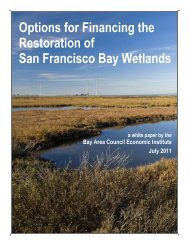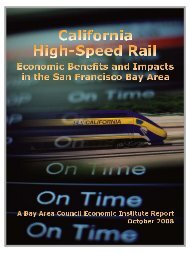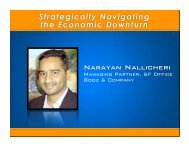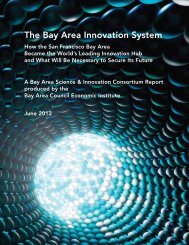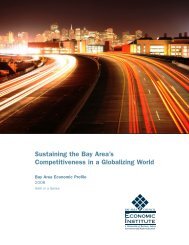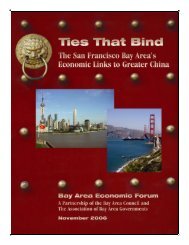PDF: 2962 pages, 5.2 MB - Bay Area Council Economic Institute
PDF: 2962 pages, 5.2 MB - Bay Area Council Economic Institute
PDF: 2962 pages, 5.2 MB - Bay Area Council Economic Institute
You also want an ePaper? Increase the reach of your titles
YUMPU automatically turns print PDFs into web optimized ePapers that Google loves.
Legal Services<br />
interim order, necessitating use of Indian counsel. The reason is that arbitration is expensive and<br />
time-consuming in many cases, as commercial arbitrators in India tend to be retired Supreme<br />
Court or High Court judges who may not be in a hurry to bring a case to conclusion since they<br />
are paid according to time spent.<br />
Indian courts, meanwhile, tend to be conservative with monetary awards and have also been<br />
inconsistent in enforcing commercial arbitration awards. India does not view the U.S. as a reciprocating<br />
territory and so will not enforce a U.S. court judgment against a party in India without a<br />
separate subsequent lawsuit being filed in India, with the overseas judgment being submitted as<br />
evidence. At the same time, a U.S. arbitral award is directly enforceable in India in accordance<br />
with India's arbitral law.<br />
Where international arbitration is a possibility, foreign law firms recommend to clients that<br />
contracts with Indian parties be written as enforceable in the laws of a neutral country, such as<br />
Singapore or the U.K.—or where Indian law is applied, that a venue outside India be used.<br />
Following the Growth<br />
Real estate work has been an important component of India practices, as Silicon Valley companies<br />
set up offices in major and “Tier 2” cities, and help locate R&D and design centers in government-sponsored<br />
tech parks or economic zones. Real estate documents are often in local languages,<br />
Patil says, and are not stored electronically, making title searches difficult. Indian laws<br />
restrict foreign ownership of land, favoring long-term leases of government-controlled or approved<br />
properties. Structuring entities offshore—Mauritius, Singapore and the British Virgin<br />
Islands are common locations—and negotiating leases in tech parks and economic zones can<br />
provide favorable tax treatment.<br />
Shirish Gupta, an associate in the Palo Alto office of Chicago-based Mayer Brown<br />
LLP and past president of the <strong>Bay</strong> <strong>Area</strong> chapter of the South Asian Bar Association<br />
(SABA), says SABA members tend to break down into two groups: younger<br />
immigration and employment lawyers, and more senior IP litigators.<br />
Gupta and other attorneys interviewed for this report agree that IP licensing and distribution<br />
agreements, along with M&A, are the key areas of growth opportunity in terms of legal services,<br />
as basic technologies pioneered by <strong>Bay</strong> <strong>Area</strong> firms are finding new applications throughout India<br />
in the automotive, energy, environmental, transportation, health care, financial, wireless and<br />
other sectors.<br />
But an overall aversion to risk, along with regulatory hurdles, continues to hold back<br />
the kind of entrepreneurial startup and vertical integration activity seen elsewhere.<br />
Attorneys and venture investors at a November 2007 India M&A panel hosted by<br />
Orrick Herrington & Sutcliffe LLP in Menlo Park, for example, observed that Indian<br />
companies are prohibited from buying over their net worth and the large family shareholders<br />
that dominate many Indian firms often refuse to dilute their holdings in cash-stock deals. On the<br />
entrepreneurial side, startups are still relatively few and venture capitalists want to see a<br />
93



